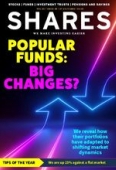Archived article
Please note that tax, investment, pension and ISA rules can change and the information and any views contained in this article may now be inaccurate.
Schroders fund manager: Why the FTSE 250 offers ‘growth at a ridiculous price’

Firmly out of favour with investors since the Brexit vote seven years ago, the FTSE 250 index rallied strongly on the release of the latest UK inflation data (19 July). This showed UK CPI rising by 7.9% year-on-year in June, lower than forecasts of an 8.2% rise, theoretically reducing expectations for the scale of future interest rate hikes from the Bank of England.
Yet even after a big one-day jump, the FTSE 250 is still down 8.2% on a five-year view at the time of writing due to the overhang of the gloomy prognosis for the UK’s post-Brexit economy.
Prevailing poor sentiment towards the FTSE 250 should pique the interest of bargain hunters, since investors do not buy GDP, they buy shares in individual companies. And the mid cap ranks offer a different collection of opportunities to the large caps and contain market leaders of tomorrow trading on inexpensive valuations today.
ABILITY TO GET EXPOSURE AT A DISCOUNT
Given the current negativity towards the UK, it is no surprise that the two dedicated mid cap funds in the investment trusts sector – JPMorgan Mid Cap (JMF) and Schroder UK Mid Cap Fund (SCP) – continue to trade on double digit discounts to net asset value.
Schroder UK Mid Cap’s 11.2% discount to underlying assets looks overdone considering its outperformance of the FTSE 250 (ex-investment companies) index over the past 25 years, no mean feat since the FTSE 250 itself outperformed not only the FTSE 100 but also the S&P 500 index of US shares over the same period.
During the six months to 31 March 2023, Schroder UK Mid Cap’s net asset value total return rose by 18.5%, comfortably outperforming the 15% return from the benchmark FTSE 250 (ex-investment companies).
PORTFOLIO REFRESHMENT
Steered by lead manager Jean Roche, a former analyst with a masters in mathematics and experienced co-manager Andy Brough, Schroder UK Mid Cap invests in mid cap equities with the aim of providing a total return in excess of the FTSE 250 (ex-investment companies) index.
Mid cap companies are attractive to investors for a variety of reasons; more established than smaller firms, they are considered less risky, yet they also tend to be faster growing than their larger, more mature counterparts.
Roche refers to the FTSE 250 as the ‘Heineken index’ since it is often refreshed by promotions, relegations, takeovers and initial public offerings (albeit IPOs have been scarce of late).
While M&A activity in the mid cap ranks has been quieter recently, Roche tells Shares she expects mergers and acquisitions to return as inflation slows down. ‘I think inflation affects the animal spirits and the willingness to pull the trigger on things,’ she says.
WHY INVEST IN MID CAPS NOW?
Roche concedes there are ‘gloomy suppositions’ in the valuations of FTSE 250 stocks at present, yet these are more than priced in as the premium that mid-caps have historically traded on relative to large caps has collapsed.
Roche says: ‘We are expecting earnings per share growth on a consensus basis of 16.6% for the index for 2024 and as you would expect, the kind of shares that we’ve included in our portfolio have slightly better growth prospects than that.’
She continues: ‘For 2024, the price to earnings ratio for the FTSE 250 index excluding investment trusts is 10-times, and that compares with the FTSE 100 on 9.9-times with EPS growth of 3.6%. You are getting “growth at a ridiculous price”, so GARP but ‘R’ for ridiculously cheap (instead of ‘reasonable’). It just feels overdone to me, like we are at max bearishness.’
SPOILED FOR CHOICE
The FTSE 250 is the domain of a wealth of companies operating in high growth niches and with sustainable and well-covered dividends.
Roche says broadly half of the revenues from her fund’s underlying companies come from international sources.
‘After the Brexit vote, a lot of the companies with international earnings were far more highly rated than the ones that were more domestic. But the valuations of some of those international ones have also tumbled, so you are spoiled for choice,’ she comments. ‘You can buy the ones with international earnings or the ones with the domestic earnings cheaply.’
Roche typically waits until a stock enters the FTSE 250 before buying, whereas promotion to the FTSE 100 offers a clear sell discipline; engineer Weir (WEIR) was the last stock sold on promotion to the blue-chip benchmark.
She is happy to buy ‘fallen angels’ back if they drop out of the FTSE 100, having done this twice with Royal Mail-owner International Distributions Services (IDS). ‘That fell out of the FTSE 100 twice and we bought it and then sold it when it went back in. That is part of the strategy – it can often be an attractive time to look at shares when they have fallen out of the FTSE 100 and people have decided that they don’t love them anymore.’
The Schroders stock picker finds additional returns in the bottom two quartiles of the FTSE 250 index, where stocks are less covered and names that have recently entered the index pop up on her radar.
LATEST ADDITIONS TO THE SCHRODERS TRUST
Recent portfolio additions include Tyman (TYMN), a supplier of components to the construction industry which was promoted to the FTSE 250 at the start of June.
Tyman is a specialist in windows, doors and seals and its products have valuable roles to play in terms of the security and sustainability of residential homes and commercial buildings.
Another recent investment for the investment trust is ME Group International (MEGP), the photobooths-to-laundry machines provider. The fund manager notes founder management with an inventor mindset are still involved in the business. Blessed with a strong balance sheet, Roche highlights that Me Group generates lots of cash which it can reinvest in the business.
WHAT ELSE IS IN THE PORTFOLIO?
Other holdings in the Schroders trust include Games Workshop (GAW), the fantasy miniatures maker behind the Warhammer franchise. In theory, Games Workshop could become a much bigger business in time due to its significant US opportunity and noting it has struck an agreement in principle with Amazon (AMZN:NASDAQ) to develop its intellectual property into film and TV productions.
The trust also has stakes in fund manager Man Group (EMG), precision measurement firm Spectris (SXS), multi-utility Telecom Plus (TEP) and Cranswick (CWK), the meat producer behind the McDonald’s McCrispy burger which has delivered a 200-fold return for investors since 1991.
Roche believes sausage, bacon, cooked poultry and pet food supplier Cranswick should have resilient earnings in the cost-of-living crisis because it sells ‘a cheaper protein, generates oodles of cash internally and is maintaining margins of around 7% or 8%’.
The trust also has positions in the likes of cash-generative retailer Dunelm (DNLM), which continues to take share in homewares and furniture as well as Inchcape (INCH), the acquisitive global automotive distributor.
Investors also get exposure to Ecora Resources (ECOR), a mining royalty business that has begun to move away from being a coal-heavy business, using the supernormal profits from this commodity to pivot towards commodities that will enable the energy transition.
Important information:
These articles are provided by Shares magazine which is published by AJ Bell Media, a part of AJ Bell. Shares is not written by AJ Bell.
Shares is provided for your general information and use and is not a personal recommendation to invest. It is not intended to be relied upon by you in making or not making any investment decisions. The investments referred to in these articles will not be suitable for all investors. If in doubt please seek appropriate independent financial advice.
Investors acting on the information in these articles do so at their own risk and AJ Bell Media and its staff do not accept liability for losses suffered by investors as a result of their investment decisions.
Issue contents
Feature
- Is active fund management a waste of time?
- Popular funds: big changes? We look at 12 widely-held names
- Not all bad news: Here are 10 stocks benefiting from the cost-of-living crisis
- Can emerging markets make the transition away from fossil fuels?
- Emerging markets: technology at the forefront, overtaking developed world on oil consumption
- Our 2023 share picks have absolutely smashed it: up 23% against a flat market
- Gilts are in demand: we explain how to buy and reasons for doing so
Great Ideas
News
- Wildfires and strikes cause investors to worry about airlines and holiday companies
- Unilever flexes its pricing power muscles, but market share losses are a concern
- Ocado’s technology arm gets investors excited again
- Liontrust shares remain in the doldrums as GAM takeover sees new twist
- Revealed: the shares which shone as the FTSE 100 has bumper week

 magazine
magazine








